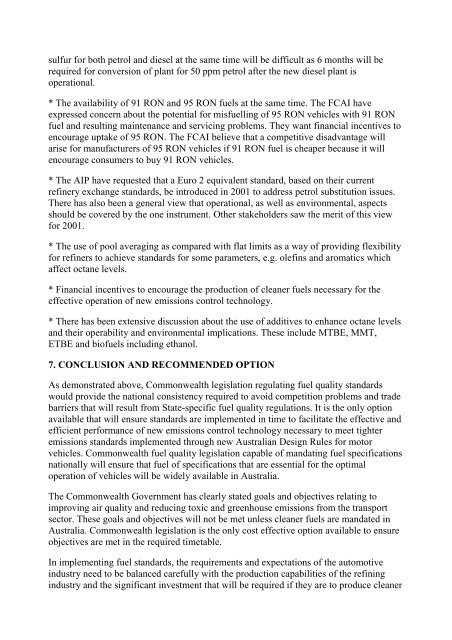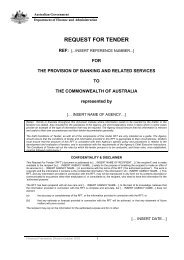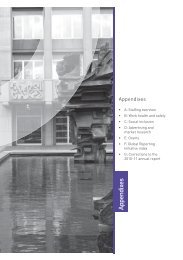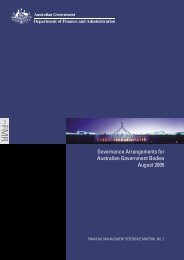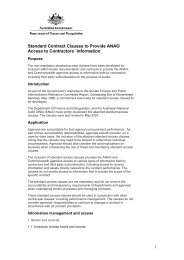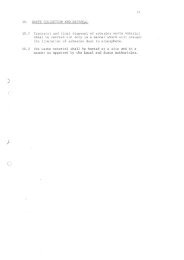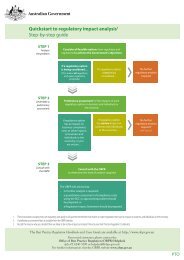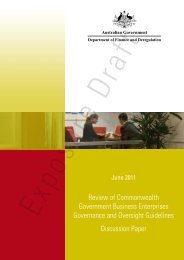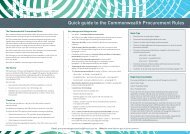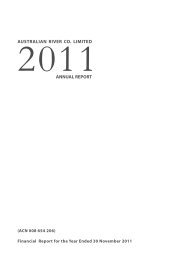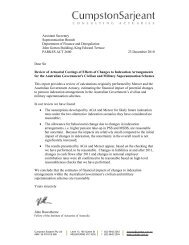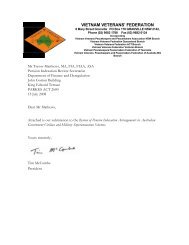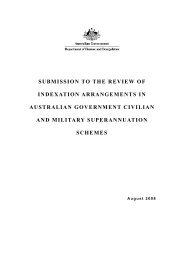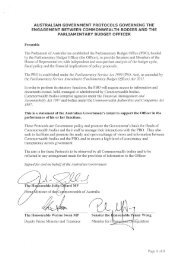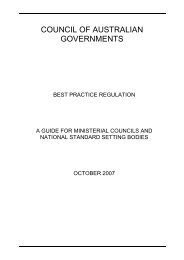National Fuel Quality Standards Regulation Impact Statement 1 ...
National Fuel Quality Standards Regulation Impact Statement 1 ...
National Fuel Quality Standards Regulation Impact Statement 1 ...
You also want an ePaper? Increase the reach of your titles
YUMPU automatically turns print PDFs into web optimized ePapers that Google loves.
sulfur for both petrol and diesel at the same time will be difficult as 6 months will be<br />
required for conversion of plant for 50 ppm petrol after the new diesel plant is<br />
operational.<br />
* The availability of 91 RON and 95 RON fuels at the same time. The FCAI have<br />
expressed concern about the potential for misfuelling of 95 RON vehicles with 91 RON<br />
fuel and resulting maintenance and servicing problems. They want financial incentives to<br />
encourage uptake of 95 RON. The FCAI believe that a competitive disadvantage will<br />
arise for manufacturers of 95 RON vehicles if 91 RON fuel is cheaper because it will<br />
encourage consumers to buy 91 RON vehicles.<br />
* The AIP have requested that a Euro 2 equivalent standard, based on their current<br />
refinery exchange standards, be introduced in 2001 to address petrol substitution issues.<br />
There has also been a general view that operational, as well as environmental, aspects<br />
should be covered by the one instrument. Other stakeholders saw the merit of this view<br />
for 2001.<br />
* The use of pool averaging as compared with flat limits as a way of providing flexibility<br />
for refiners to achieve standards for some parameters, e.g. olefins and aromatics which<br />
affect octane levels.<br />
* Financial incentives to encourage the production of cleaner fuels necessary for the<br />
effective operation of new emissions control technology.<br />
* There has been extensive discussion about the use of additives to enhance octane levels<br />
and their operability and environmental implications. These include MTBE, MMT,<br />
ETBE and biofuels including ethanol.<br />
7. CONCLUSION AND RECOMMENDED OPTION<br />
As demonstrated above, Commonwealth legislation regulating fuel quality standards<br />
would provide the national consistency required to avoid competition problems and trade<br />
barriers that will result from State-specific fuel quality regulations. It is the only option<br />
available that will ensure standards are implemented in time to facilitate the effective and<br />
efficient performance of new emissions control technology necessary to meet tighter<br />
emissions standards implemented through new Australian Design Rules for motor<br />
vehicles. Commonwealth fuel quality legislation capable of mandating fuel specifications<br />
nationally will ensure that fuel of specifications that are essential for the optimal<br />
operation of vehicles will be widely available in Australia.<br />
The Commonwealth Government has clearly stated goals and objectives relating to<br />
improving air quality and reducing toxic and greenhouse emissions from the transport<br />
sector. These goals and objectives will not be met unless cleaner fuels are mandated in<br />
Australia. Commonwealth legislation is the only cost effective option available to ensure<br />
objectives are met in the required timetable.<br />
In implementing fuel standards, the requirements and expectations of the automotive<br />
industry need to be balanced carefully with the production capabilities of the refining<br />
industry and the significant investment that will be required if they are to produce cleaner


